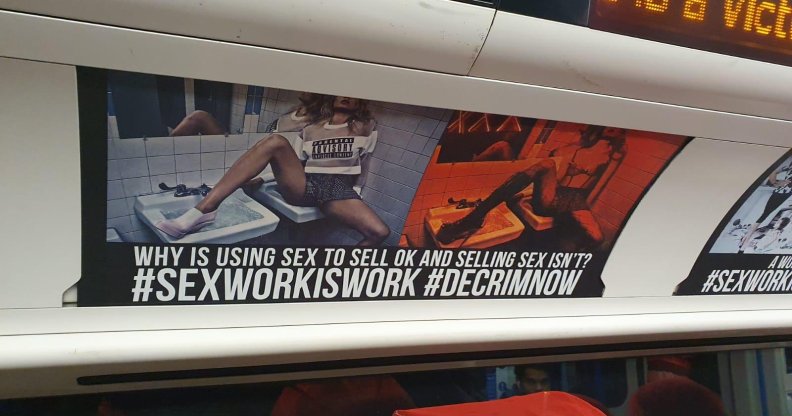Campaign calling for sex work to be decriminalised goes viral after being plastered over London tube

The posters appeared on London’s underground over the weekend, which saw a sex workers strike on International Women’s Day. (Twitter/pastachips)
An adhacking campaign advocating sex work decriminalisation has appeared on the London Undergound – to viral results.
The new posters, which appeared during the London-wide sex worker’s strike on International Women’s Day, call for sex work to be decriminalised on the basis of safety for women.
“Why is using sex to sell OK and selling sex isn’t?” asks one poster, shared on Twitter by Molly Smith, the co-author of Revolting Prostitutes: The Fight for Sex Workers’ Rights.
In a tweet that has been liked more than 3,500 times, Smith shared photos of the adhacking campaign alongside images of a demonstration by activists wearing red veils
check out the Victoria line #sexworkiswork #decrimnow #InternationalWomenDay2020 pic.twitter.com/lhurTAuFmZ
— molly smith (@pastachips) March 8, 2020
Another set of Tube posters read: “Most sex workers are mothers supporting families. Outlaw poverty not prostitutes,” and, “Two thirds of sex workers have suffered violence. Decriminalise sex work. Safety first.”
All the posters, which have been attributed to the English Collective of Prostitutes, bear the slogan #decrimnow.
huge and emotional love for the tube ad hacking by the english collective of prostitutes! #sexworkiswork #decrimnow pic.twitter.com/lPvZVEnTqH— flirting. | ? (@actualflirting) March 8, 2020
The campaign to decriminalise sex work cites the need for sex workers to receive rights like sick and maternity pay, pension provision, and guaranteed basic pay.
In a piece for the i, journalist Frankie Miren said that the sex-work strike “will draw attention to the fact that, although buying and selling sex is legal in England and Wales, most activities associated with the transaction are criminalised”.
“Working together indoors is illegal, as is soliciting. Sex workers say being forced to work alone, in isolated areas, makes them more vulnerable to abuse,” Miren wrote.
#DecrimNow #SexWorkIsWork ads on the London tube (makes me want to move there!) pic.twitter.com/8DcB3jge5R— Sex Workers Outreach Project Portland (@SWOP_PDX) March 9, 2020
Soho is buzzing with Decrim March right now!!! So proud of the incredible womxn marching! #InternationalWomensDay2020 #DecrimNow pic.twitter.com/o3auN76yIu— ????? (@Vegan_Vamp) March 8, 2020
In a recent interview with PinkNews, Labour deputy leadership hopeful Dawn Butler explained why she thinks the UK law on the buying and selling of sex is “out of date” and “need amending”.
“My view is that whatever we do, we need to protect the most vulnerable and the most vulnerable in the equation of sex work is the sex worker,” Butler said.
“And so whatever happens you have to look at whether the sex worker is more or less protected in terms of what you’re suggesting as a solution.
“Some people say you criminalise the buyer and that will reduce the demand. And we have to look at the statistics around that to see if that really has reduced the demand, or whether it drives sex work deeper underground.
“And if it drives sex work deeper underground, then you make the sex worker more vulnerable.
“For me, at the core of this is whatever we do, it has to protect the sex worker and make them safe.”
I just saw an article about posters on the London tube that say “why is using sex to sell ok and selling sex isnt? #sexworkiswork #decrimnow”
and honestly? the best way I’ve ever heard it put— Peaxh??♀️Pixie (@PeaxhB) March 9, 2020

